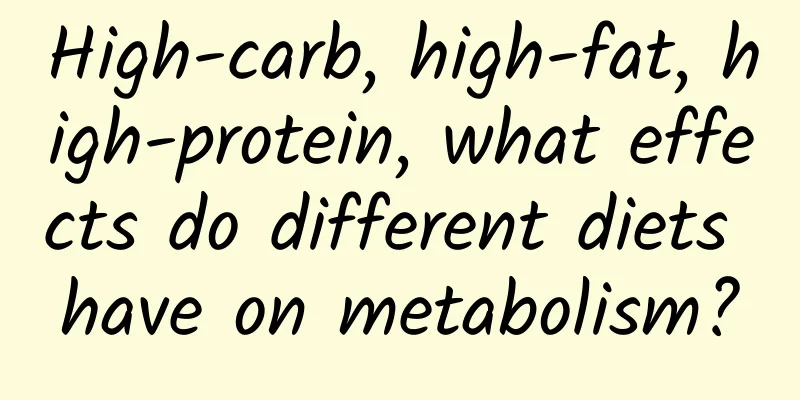High-carb, high-fat, high-protein, what effects do different diets have on metabolism?

|
The renowned international journal in the field of nutrition, Nutrition, recently published online a paper by Lin Xu's research group at the Shanghai Institute of Nutrition and Health, Chinese Academy of Sciences. This short-term intervention study systematically compared for the first time the effects of different dietary macronutrient ratios, body mass index (BMI), and exercise and resting states on energy metabolism and clinical cardiovascular metabolism-related indicators and metabolome profiles under isoenergetic conditions. With the rapid transformation of lifestyle, obesity and related cardiovascular metabolic diseases have become the main threats to my country's economic development and national health. Discovering effective dietary intervention strategies is of great significance for the prevention and control of such diseases. The total intake and proportion of macronutrients including carbohydrates, fats and proteins, individual body weight, and resting/exercise energy expenditure and substrate metabolism all play an important role in regulating energy balance and cardiovascular metabolic health. The use of metabolomics in intervention studies can reveal the metabolic status and metabolic pathways of different nutrients in the body more deeply and objectively. However, there is still controversy about the relationship between total dietary energy, macronutrient composition and metabolic health, and overweight and obesity can also affect basal energy metabolism and substrate consumption rate to varying degrees. To date, there is a lack of intervention research data that systematically evaluates the effects of different dietary macronutrient ratios, body weight and exercise on energy expenditure, glucose and lipid metabolism and metabolomics. In this 3×2×2 randomized controlled, crossover-designed short-term dietary intervention study, the team of researcher Lin Xu recruited a group of male volunteers aged 18-45 years old, including 20 normal weight and 20 overweight/obese, and gave them three isoenergetic experimental diets with different macronutrient ratios (high carbohydrate + low fat, low carbohydrate + high fat, high protein + low fat) in random order, and each diet was consumed for two consecutive days. On the first day (resting day), the resting energy expenditure at multiple time points of 0, 1, 2, and 3 hours after the meal was measured by indirect calorimetry, and the energy expenditure of 30 minutes of moderate-intensity cycling exercise before the meal and after the meal was measured on the second day (exercise day). Fasting and 2 hours after the meal blood samples were collected on both the resting day and the exercise day. The washout period between different diets was 10 days. By systematically analyzing the data before and after the three dietary interventions, the researchers found that there were no significant differences among the three diets in terms of total energy expenditure, dietary thermal effect, and subjective satiety after meals; moderate-intensity exercise can significantly increase the carbohydrate oxidation rate after a high-carbohydrate meal and significantly reduce the fat oxidation rate. The increase in blood glucose and insulin 2 hours after the high-carb diet was significantly higher than that of the other two diets; the increase in triglycerides 2 hours after the high-fat diet was the largest; the increase in blood glucose and total cholesterol 2 hours after the high-protein diet was the smallest. Exercise can significantly reduce the effect of high-carb diet on increasing blood glucose and insulin. By collaborating with researcher Yin Huiyong's team to carry out non-targeted metabolome testing, we discovered 69 effect metabolome markers that can significantly distinguish the responses to the three dietary regimens 2 hours after meals. These markers are mainly enriched in arginine synthesis, cysteine and methionine metabolism, as well as glycine, serine and threonine metabolic pathways. The amino acids with the highest effect values are homocysteine, histidine, tryptophan, etc. Compared with normal-weight individuals, overweight/obese volunteers showed lower carbohydrate oxidation rate, higher fat oxidation rate, larger postprandial insulin and triglyceride increments, and more postprandial metabolite changes and higher magnitude of changes, suggesting that overweight/obese individuals are less able to regain metabolic homeostasis after a meal than normal-weight individuals. In summary, compared with macronutrients, total dietary energy may have a more significant effect on postprandial energy expenditure, and isoenergetic meals with different macronutrient ratios have different effects on postprandial cardiovascular metabolic indicators, which are regulated by body weight and exercise. This study provides a scientific basis for the formulation of precise weight loss intervention programs in the future. |
Recommend
What causes calf pain during pregnancy?
Some expectant mothers often feel sore calves in ...
Will I still get stretch marks after having a second child?
Women who have given birth will have stretch mark...
Why is there yellow liquid?
Women's vaginal secretions often become abnor...
What are the reasons why women have miscarriages? Five reasons to be vigilant
For women, what they need to pay more attention t...
How many days can you test whether you are pregnant?
From ovulation to embryo implantation, it's t...
When can I move in after painting a house with latex paint? Can I move in after painting a house with latex paint for a month?
We all know that when decorating a house, many pe...
To prevent AIDS, start from 7 aspects and don't take it lightly
Currently, more than 35 million people worldwide ...
What is bacterial vaginosis?
It is very common for women to suffer from gyneco...
These four habits when cooking may double the carcinogens!
This article was reviewed by Liu Shaowei, Deputy ...
What causes leucorrhea and low back pain?
If there is excessive vaginal discharge or it is ...
What to do if you have constipation after cesarean section
Many women choose to give birth by cesarean secti...
National Eye Care Day | All the common methods of myopia correction you want to know are here
Editor's Note: June 6, 2024 is the 29th Natio...
The gestational sac was discharged on the second day after the medical abortion
After external injection or oral administration o...
Appendicitis location picture female
The location of appendicitis is usually in the lo...
Pain on the right side of the right breast
If female friends often feel pain on the edge of ...









